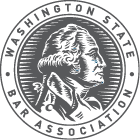Frequently Asked Questions About Filing Trust Account Declaration
Why do I have to provide the bank and account number of my IOLTA account?
This information is required by rules adopted by the Washington Supreme Court:
- for lawyers, Rule for Enforcement of Lawyer Conduct 15.5
- for LLLTs, Admission and Practice Rule 28
- for LPOs, Admission and Practice Rule 12
It may be provided to the Legal Foundation of Washington so that they may verify that the bank is turning over all appropriate funds to the Foundation.
Do I also list other account numbers besides my IOLTA account?
No. Do not list individual client trust accounts or other non-IOLTA accounts.
What if I do not have a trust account now because I do not handle client funds, but I had one for part of this year or I expect to have one next year?
The trust account declaration question should be answered according to the facts as they exist on the date the information is certified. You do not need to report closed IOLTA accounts - only currently open accounts. You do not need to notify the WSBA if you open an IOLTA account midyear. You report only once a year.
Where can I complete the Trust Account Declaration?
You can complete the Trust Account Declaration during the online license renewal process beginning in November. Only active licensed legal professionals are required to fill out the Trust Account Declaration.
Where is the authority requiring the Trust Account Declaration?
This information is required by rules adopted by the Washington Supreme Court:
- for lawyers, Rule for Enforcement of Lawyer Conduct 15.5
- for LLLTs, Admission and Practice Rule 28
- for LPOs, Admission and Practice Rule 12
Must I file this declaration every year, even if it hasn't changed from last year?
Yes, it isn't sufficient to indicate that there has been no change from the previous year. The rules require each active licensed legal professional to file this declaration annually. The information you provide needs to be current and complete.
If I don't file the Trust Account Declaration, won't it be obvious I don't have a trust account?
No. If you fail to file the Trust Account Declaration, we do not assume that you do not maintain a trust account. Also, your license to practice law may be suspended for failure to file the Trust Account Declaration.
Do I have to file the Trust Account Declaration if I'm not engaged in the practice of law?
Yes, you must file the Trust Account Declaration if you are an active licensed legal professional regardless of whether you are practicing law or have an IOLTA account.
Can my firm fill out my Trust Account Declaration for me?
The rules specify that each active licensed legal professional must provide this information annually.
If I practice in multiple states or Canadian provinces, whose rules do I follow?
The WSBA Trust Account Declaration relates only to trust accounts maintained for the deposit of client funds received in connection with representations undertaken using your Washington license. All states and provinces have different requirements regarding safekeeping of client funds. When you receive client funds, you must analyze if you are holding these funds in connection with a representation where you are using your Washington license. If you are using your Washington license, then you must place these funds in an IOLTA account that meets the requirements of RPC 1.15A, LLLT RPC 1.15A or LPO RPC 1.12A.
If you have IOLTA accounts in other states or Canadian provinces, you should not provide information regarding those accounts when filing your Washington Trust Account Declaration.
What if I have additional questions?
Call the WSBA Service Center at 800-945-9722 or 206-443-9722, or email questions@wsba.org.
Frequently Asked Questions about Client Trust Accounts
What is a client trust account?
A client trust account is an account maintained at a bank, savings and loan, or credit union for the purpose of holding client funds. See RPC 1.15A, LLLT RPC 1.15A or LPO RPC 1.12A for the member's ethical obligations regarding handling client funds and RPC 1.15B, LLLT RPC 1.15B or LPO RPC 1.12B for additional information about maintaining client trust accounts.
Does every member need to have a client trust account?
No. A client trust account is required only if the member handles client funds. Client funds are funds in your or your firm's possession that belong to your clients or third persons. These funds are received in connection with services for which you are required to use your Washington license. Examples of client funds are advance fee deposits, settlement proceeds, escrow funds, and client overpayments. Earned fees you receive are not client funds. If you receive only earned fees from clients, you should check that you do not handle client funds.
What is an IOLTA account?
IOLTA stands for Interest on Lawyer's Trust Accounts, Interest on LLLT's Trust Accounts, and Interest on LPO's Trust Accounts. An IOLTA account is an interest-bearing trust account, with the interest paid to the Legal Foundation of Washington for deposit of client funds.
What happens to the interest earned on an IOLTA account?
Interest on an IOLTA account is payable to the Legal Foundation of Washington, a nonprofit organization that is independent from the WSBA. The Foundation distributes the funds it receives to civil legal aid programs in Washington.
What is an "individual" client trust account?
An individual client trust account is an interest-bearing account set up for one client, where the interest goes to that client instead of the Legal Foundation of Washington. It is set up in the client's name using the client's tax ID number.
What if a lawyer is admitted in Washington and also in another state, and practices wholly or partly in that other state?
The Trust Account Declaration relates only to the practice of law under your Washington license. The Rules of Professional Conduct Committee issued an informal opinion that if client funds come into a lawyer's possession as a result of the lawyer's practice under the lawyer's Washington license, then those funds should be handled as required by the Washington rules. Otherwise, the lawyer must comply with the rules of the jurisdiction in which he or she practices.
Where can I get more information about complying with the trust account rules?
Visit the IOLTA and Client Trust Accounts webpage.






